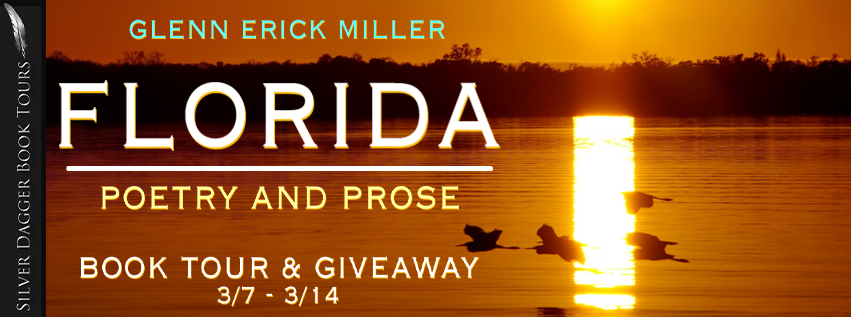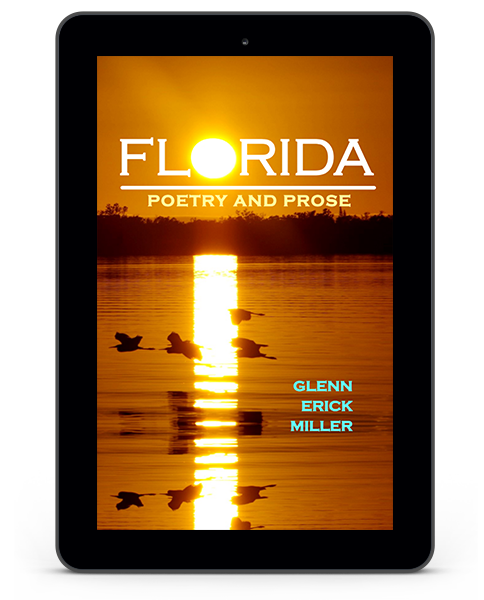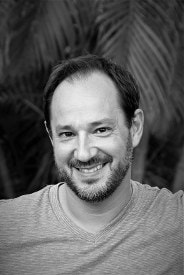Florida offers lush landscapes, infinite sunshine, and a chance for renewal. But its footing as a place of refuge and joy continues to shift as easily as its miles of sandy shoreline.
Florida: Poetry and Prose
by Glenn Erick Miller
Genre: Poetry, Fiction
Florida is a land of extremes.
Depending on the perspective, it can be seen as either beacon or
demon. It is an epicenter of dreams, both wonderful and broken. It
offers lush landscapes, infinite sunshine, and a chance for renewal.
But its footing as a place of refuge and joy continues to shift as
easily as its miles of sandy shoreline.
Florida: Poetry
and Prose explores our complicated relationship with place. This
love story serves as the backdrop for observations on identity,
family, and the desperate attempt to safeguard memories against the
march of time. The poems speak to the longing for human connection
and the promise of permanency. At the same time, they revel in satire
and the irony of setting down roots in a paradise that may soon be
under water.
The collection is anchored by a pair of short
stories which pit tragedy-tested love against the stark realities of
nature and an increasingly uncertain world.
SNOWBIRD
Snowbird
is
a slam.
I’ve
used
the
term
myself.
Never
is
a stupid
thought.
I’ve
used
the
word
myself.
A
snowbird knows
when
to leave
and
when to go back.
It
is buried in her,
this
call to move with the seasons,
traveling
lightly with no possessions.
“Why
deny it?” she asks. “Just accept it,
and
enjoy the scenery.”
What
kind of bird
stays?
What do you call
a
bird that stores
food
and insulates
their
home and puts
together
jigsaw puzzles
to
fritter away
the
horrible night?
What
kind of bird
chooses
to wear
a
badge of
martyrdom
when
paradise
is
just
a
flight
away?
THERE IS A ME
There
is a me
who
loves the sea.
He’s
built a cottage so close
that
the tide rolls through
his
thatched rooms.
His
floor is a carpet of white shells.
He
begins each day, thirsty
to
plunge his toes in the wet sand once more.
He
owns two shirts—one with no collar, one with no sleeves.
He
goes shirtless.
His
ratty shorts are held up by rope,
like
Robinson Crusoe.
He
is the master of his islet,
the
overseer of his own key,
happily
adrift in the great gulf of time and place.
Condominiums
rise behind him like monsters,
but
he keeps his eyes—
those orbs tinted orange
from a lifetime of drinking sunsets—
fixed
on the wide, shallow sea
of
another me.
ALLIGATOR
I’ll
see you later
when
the rainy season roars in
and
the snowbirds preen their feathers
and
fly back north.
I’ll
see you later
when
the sugar cane burns
and
our nostrils fill with
butterscotch
smoke.
I’ll
see you later
at
the runway’s edge
where
Lear jets scream
bringing
billionaires
to
the Everglades Ball.
I’ll
see you later
beside
the water hazard,
you
a low-slung armored tank
in
a world of drink carts and plaid shorts.
I’ll
see you later
behind
Starbucks—
no,
the other Starbucks,
on
9th Street—
no,
the other 9th Street,
besides
the Walgreens—
no,
the other Walgreens—
the
one with the liquor store.
I’ll
see you later, too,
down
at the zoo,
where
there are dozens
of
you.
I’ll
see you later, say,
in
the year 3028,
when
I wake from a deep freeze
to
state,
“You,
my friend,
haven’t
changed a bit.”
(NOT) ONLY IN FLORIDA
It’s not only in Florida
where neighbors go crazy,
wear pajamas to church,
and wrestle man-sized reptiles (for fun).
It’s not only in Florida
where teens surf in a hurricane,
hurl hot dogs at cops
and impersonate doctors
and lovers.
It’s not only in Florida
where men confess to murdering their
make-believe friends
and break back into prison
to visit their real ones.
But it might be
only in Florida
where people
shoplift parrots,
hunt pythons
for bounty,
steal floating
tiki bars and Segways,
tattoo
“Flo-Grown” on their fingers,
wrestle gators
(for money),
build bridges
over oceans,
build fences
for the panthers,
and come to
plant their toes
in the white
sands of paradise,
hiding at the
reposed lower lip
of America.
ANCHORS
(excerpt)
After a few more trips
to the garage, there were only two plants left. Ed moved the ladder nearer to
the edge of the pool and climbed, the wind gusting against his back. He had a
sudden, aching desire to have a beer with Frank, to bust each other’s chops and
doze off as afternoon turned into night. Ed hoped the power would stay on long
enough for Iris to cook something in the crockpot, making the house smell like
pot roast or chili.
He decided he’d ask
her. No, he would just do it himself. She was busy besides. He’d rustle up some
chili with diced onions and peppers, like she preferred. And maybe, when the
game was over, he’d mute the television and just tell her what he’d been thinking
about lately: that he didn’t want to die in Florida. That it’s a hellish place,
that the ocean and all the storms terrify him. That their neighbors annoy him
with their incessant talk of golf, fishing, and the price of prescriptions.
He’d tell Iris that he wanted them to move back home.
Ed descended the
ladder. His foot slipped, but with his hands occupied, he had to find balance
some other way. He shifted his weight and leaned forward.
The power went out when
he was on the bottom rung. The storm, with its hideous green darkness now
unabated by any artificial lights, roared. It unleashed a torrent of wind and
rain, heavier than anything Ed could imagine possible.
It was too much for
him; he couldn’t fight it. He felt his feet lift away from the ladder. He was
suspended for a split second, then the wind slapped him backward into the pool.
Interview
about self
1.
Where were you born/raised?
a.
I was born in Clinton, NY, a quiet college town
that sits along the I-90 corridor. Though I worked summers at the private
college on the hill, I couldn’t afford to attend (nor did I earn good enough
grades), so I followed an older brother to SUNY Oswego. It was a blast. I
double majored in Fine Art and English and made some wonderful life-long
friends there along Lake Ontario. Since before I was born, my family began
camping in the Adirondack Park each summer. Fifty-plus years later, the
tradition is going strong. The wilderness of the park, along with raising my
own kids in its foothills, inspired my first novel “Camper Girl” (Fitzroy
Books) and some of the poems in “Florida: Poetry and Prose.”
2.
How did you become a published author?
a.
My parents taught us the importance of a strong
work ethic. My siblings (there are eight of us!) and I are nothing if not hard
workers. With that trait instilled in me, I was really, really persistent about
getting my writing published. For years, I submitted my stories and poems to
hundreds of literary journals. As a graduate student at SUNY Binghamton, I
wrote my first novel. I couldn’t find a publisher for it (it was a good first
effort, but it wasn’t ready for prime time), so I wrote another novel. More
years, many drafts, and a lot of rejection letters later, “Camper Girl” found a
home with a wonderfully supportive publisher. Short answer? I kept learning,
kept working, and kept trying.
3.
Who are some of your favorite writers?
a.
I’ve been a fan of Louise Erdrich ever since
stumbling upon her novel “The Beet Queen” in high school. Her poem “Advice to
Myself” has been a constant inspiration for me as I pursue the writing craft.
There are too many to mention, but other favorite poets include William Carlos
Williams, Natalie Diaz, Billy Collins, and Mary Oliver. I’m drawn to poems that
examine love, nature, and the magic of everyday moments. I also enjoy reading a
lot of different genres, from biographies and histories to sci-fi and young-adult
novels.
4.
How long does it take to write a book?
a.
I drafted my novels “Camper Girl” and “Goon”
(which comes out later this year) during National Novel Writing Month, or
NaNoWriMo. So, if we’re talking about how long it takes to write the first
draft, the answer is about a month. Of course, there is a ton of revising and
editing to do afterwards, but challenges like NaNoWriMo are helpful to get
ideas down on the page quickly. If we’re talking about the entire novel-writing
process, from first draft to publication, the answer is multiple years. “Camper
Girl” took nearly ten years all together, though there was a lot of time during
that period where I shelved it to focus on other projects. “Florida: Poetry and
Prose” took less time, but if I was to set the starting point when I first
began thinking about putting together a collection, then it took about three
years total.
5.
What are some future writing projects you have
in mind?
a.
Currently, I’m finishing up the sequel to
“Camper Girl.” Having enjoyed writing a d publishing “Florida: Poetry and
Prose” myself, I’m also excited to start work on a short story collection. I
have tons of drafts, both polished and rough, and ‘story seeds’ that I hope to
bring together someday. On top of that, I have ideas for more young-adult
novels, one of which is a murder mystery set on a remote college campus.
Overall, the more I write, the more I fall in love with writing.
Glenn Erick Miller is the award-winning author of "Camper Girl," a Young Adult novel and "Red's First Snow," a picture book. Another picture book, "What Can it Become?" won a Florida SCBWI's Rising Kite Award and is forthcoming.
He earned his BA from SUNY Oswego and MA from Binghamton University. During his long career in education, he has been a tutor, program coordinator, GED teacher, and college professor. He divides his time between New York's Adirondack Mountains and Southwest Florida.
Website * Facebook *Instagram * Amazon * Goodreads
Follow the tour HERE for special content and a giveaway!
$10 Amazon









This looks like a good book of poetry. Thanks for sharing.
ReplyDelete